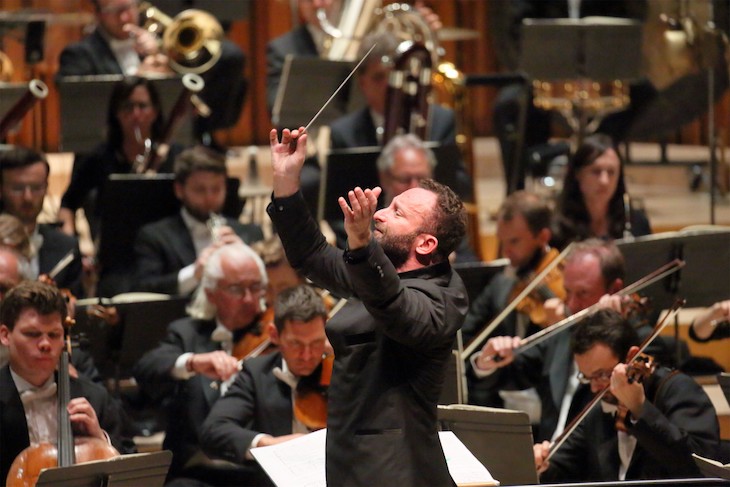The picnic hamper’s open, the bubbly is chilled, and country house opera is starting to eat itself. When you arrive at the Wormsley Estate you enter a fantastic, baffling world. Figures in black tie stroll between topiary hedges in obedience to unstated rules, while serving staff hover a few paces behind, gliding silently in to reassert neatness and order. Children dressed in red (they’re from a local Scout group) pop up to help and guide. Then the new production of Die Zauberflöte begins and with a deft, surreal spin, the director Netia Jones bowls it all straight back at you.
That’s a big part of the fun here. Jones has designed the production herself, and she clearly has quite a DVD collection. Act One resembles The Draughtsman’s Contract, complete with box hedges and symbolic geometrical forms, though surveillance cameras cluster, dove-like, on a Georgian façade. Act Two is set in the Red Room from Twin Peaks, with a few quotes from The Handmaid’s Tale. Jones moves her characters across Garsington Opera’s wide stage like pieces in a puzzle, dressed in crisp blacks, whites and reds, and surrounded by inventive details. The Three Boys whizz about on roller skates, Tamino (Benjamin Hulett) and Pamina (Louise Alder) are straight out of the Boden catalogue, while the gamekeeper Papageno (Jonathan McGovern) spoils the upmarket idyll by wringing the neck of a luckless crow.
This is a smashing cast: fresh-sounding, and each bringing slightly more to the table, vocally, than you necessarily expect with a Zauberflöte. Hulett’s voice has a heroic ring, and McGovern is one of the most purely lyrical Papagenos I’ve heard, layering tenderness on top of his grubby, put-upon characterisation. Alder’s Pamina approached him with compassion, and found a new shade of tone and meaning in each phrase of her ‘Ach, ich fühl’s’ (amazingly, she’s also in the middle of a run as Sophie in Der Rosenkavalier at Glyndebourne). Sen Guo, as the Queen of the Night, made each aria into an expression of wounded dignity as well as a firework display, and it’s no discredit to Christian Curnyn’s springy, slimline conducting to say that the orchestra never imposed itself between singers and audience.
So why did it all feel so cold — and so confusing? Characters often stood far apart, and Garsington (unlike almost every other UK opera company) presents it in German, losing the human connection that forms when an audience can react in real time. I don’t think I’ve ever heard fewer laughs in a Zauberflöte. Monostatos (Adrian Thompson) chloroformed Pamina twice, shotguns were brandished and, in keeping with Jones’s broadly feminist interpretation, Tamino joined a misogynistic cult headed by a Sarastro (James Creswell) with serious boundary issues.
It’s an angle, certainly. The problem was that to make it hold up, Jones has invented additional characters and scenes, and heaven knows this isn’t a plot that needs any more complication. A sinister red-cloaked puppetmaster stalked the Queen of the Night, and the sublime moment when Tamino and Pamina agree to face their trials as equals was contradicted by a lot of background bluster. To equate Mozart’s Enlightenment-era masonic symbolism with swivel-eyed modern stereotypes is cheap and distorting, however stylishly staged, and the final chorus disappeared under a visual chaos of conflicting ideas and actions. Yes, classics can — and must — be interrogated, reinvented, subverted. But the music has its own agenda, and if a director can’t (or won’t) believe in Mozart and Schikaneder’s fundamental good faith, nothing about Die Zauberflöte will ever quite add up.
At the Barbican, other mysteries unfolded. When the conductor Kirill Petrenko was named as Simon Rattle’s successor at the Berlin Philharmonic, the general reaction in the UK was a baffled shrug. Petrenko has rarely appeared in this country, and the repertoire for this concert with the Bavarian State Orchestra — Mahler’s notoriously awkward Seventh Symphony — could have been chosen to maintain that aura of inscrutability. There’s no real slow music in the symphony, and in the Barbican Hall there was no chance of anything truly quiet either, though this certainly wasn’t the first visiting orchestra to play it safe in that wretched acoustic.
Still, Petrenko’s Mahler was impressive for all sorts of reasons — in its rhythmic snap and bandmasterly directness; in the way Petrenko nipped and tucked Mahler’s baggy monster of a finale into a semblance of almost Haydn-like coherence and wit; and in the sense it gave of a team of virtuoso musicians playing without any ‘super-orchestra’ slickness. It was like seeing a great engine running full tilt with the bonnet up and everything whirring and pumping away. Petrenko, meanwhile, came across as intensely musical, deeply engaged with his musicians, and largely uninterested in the response of the public. Many will see that as admirable.






Comments